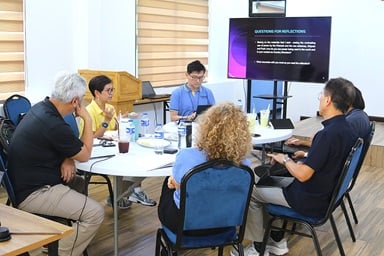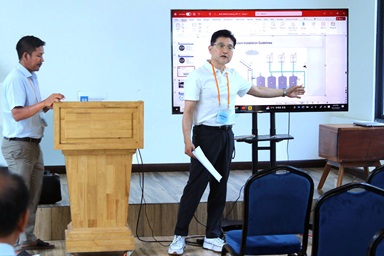Coming from a country where recent civil war and corruption claimed 3 million lives, the Rev. Kimba Kyakutala Evariste of Democratic Republic of Congo, understands firsthand the importance of peace and reconciliation.
Kyakutala, president of Kabongo Methodist University, will travel to Hiroshima, Japan, later this month to join United Methodist scholars from around the world for the triennial International Association of United Methodist Schools, Colleges and Universities conference.
Gathering in a city nearly destroyed by the world’s first deployed atomic bomb in 1945, participants will focus on “Peace, Reconciliation and Human Rights.” The May 24-28 event will touch on broad themes of interest to an international audience with special attention to Hiroshima’s historic connection to peace as well as efforts for reconciliation in the Asian Pacific context.
Kyakutala said he hopes to “learn from other institutions, share experience in the educational sector and seek to develop cooperation and relationships for mutual benefit.” A doctor of ministry candidate at Saint Paul School of Theology, Kansas City, Mo., he also serves on the Standing Committee on Central Conference Matters, coordinates volunteers in mission for the North Katanga Annual Conference and directs the International Leadership Institute in the DRC.
“I am looking forward to seeking supportive partnership with other institutions that can help my school develop and … offer quality education to our students in the village,” he added.
As of mid-April, students and faculty from more than 25 countries had registered for the conference. They represent institutions in Africa, Asia, Europe, Latin America and North America, according to Amos Nascimento of the United Methodist Board of Higher Education and Ministry. Nascimento is helping to coordinate the event.
Hiroshima Jogakuin, a Methodist school with deep roots in Hiroshima and international peace education, will host the conference.
“An association of Methodist-related schools, colleges, and universities in Japan is emerging,” Nascimento said, “so many among the 18 institutions there are involved in this process. The leading ones are Aoyama Gakuin University (Tokyo), Kwansei Gakuin University (Kobe) and Hiroshima Jogakuin University (Hiroshima). These three constitute the task force organizing the conference.”
‘The church can make … a difference’
Nobel Peace Prize winner Ellen Johnson Sirleaf, the president of Liberia and a United Methodist keenly interested in education, has been invited to be a keynote speaker at the opening ceremony May 25.
Pre-conference seminars will involve educators, leaders, scholars and chaplains from around the world to engage on topics such as human rights, ethics and social responsibility, and theology and peace. Conference participants — both faculty and students — will present scholarly papers. However, Kyakutala said he would have other assignments such as translating from English to French and leading a panel.
Acknowledging The United Methodist Church’s involvement in peace with justice work around the world, Kyakutala believes it could do more.
“The church can make and is still making a difference,” he said, “through preaching the good news, doing counseling, defending the poor and the oppressed and giving charity services to those in desperate need. But, in most cases, the church should continue to stand for justice (and) advocate for peace and rule of law to reduce the threat of war and instability.
“Political, economic and religious freedom should be guaranteed to all citizens for long and lasting peace to prevail in the world.”
Kyakutala said his participation in peacemaking ministries would not end when the conference adjourns.
“I want to create a world of people who love each other; stand for justice, peace and forgiveness; and (are) ready to reconcile in order to make a better world,” he said. “The information gained will be used through sermons, seminars and workshops to encourage (people) to seek and stand for peace, reconciliation and human rights.
“In making disciples of Jesus Christ for the transformation of the world, we need to be transformed ourselves first.”
*Dunlap-Berg is general church content editor, United Methodist Communications, and associate editor, Interpreter.
Like what you're reading? Support the ministry of UM News! Your support ensures the latest denominational news, dynamic stories and informative articles will continue to connect our global community. Make a tax-deductible donation at ResourceUMC.org/GiveUMCom.





